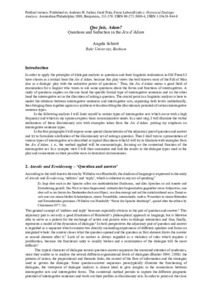Datum
1999Autor
Schrott, AngelaSchlagwort
440 Französisch, romanische Sprachen allgemein OnomasiologieInterrogativsatzIllokutiver AktFranzösischHistorische PragmatikMetadata
Zur Langanzeige
Teil eines Buches
Que fais, Adam?

Que fais, Adam?
Questions and Seduction in the Jeu d’Adam
Zusammenfassung
In order to apply the principles of dialogue analysis to questions and their linguistic realisations in Old French I have chosen as a textual basis the “Jeu d’Adam”, because this play views the well-known story of the Fall of Man also as a dialogic play with the seductive power of questions. Thus, the “Jeu d’Adam” seems a good field of examination for a linguist who wants to ask some questions about the forms and functions of interrogatives. A study of questions implies on the one hand the specific formal type of interrogative sentences and on the other hand, the interrogative act as the illocution of asking a question. The crucial point in a linguistic analysis is here to model the relations between interrogative sentences and interrogative acts, separating both levels methodically, then bringing them together again in a synthesis when describing the illocutionary potential of certain interrogative sentence types.
In the following analysis, I will limit myself to certain types of interrogative acts which occur with a high frequency and which in my opinion express basic communicative needs. In a next step, I will illustrate the verbal realisations of these illocutionary acts with examples taken from the “Jeu d’Adam”, putting my emphasis on interrogative sentence types. In the first paragraphs, I will expose some special characteristics of the adjacency pair of question and answer and try to formulate a definition of the illocutionary act of asking a question. Then I shall turn to a presentation of various types of interrogative acts described as typical illocutions, which I will try to illustrate with examples from the “Jeu d’Adam”, i. e., the method applied will be onomasiologic, focusing on the contextual function of the interrogative act. In a synoptic view, I will then summarise and link the results to the dialogue types used in the play and concentrate on their possible roots in historical circumstances.
In the following analysis, I will limit myself to certain types of interrogative acts which occur with a high frequency and which in my opinion express basic communicative needs. In a next step, I will illustrate the verbal realisations of these illocutionary acts with examples taken from the “Jeu d’Adam”, putting my emphasis on interrogative sentence types. In the first paragraphs, I will expose some special characteristics of the adjacency pair of question and answer and try to formulate a definition of the illocutionary act of asking a question. Then I shall turn to a presentation of various types of interrogative acts described as typical illocutions, which I will try to illustrate with examples from the “Jeu d’Adam”, i. e., the method applied will be onomasiologic, focusing on the contextual function of the interrogative act. In a synoptic view, I will then summarise and link the results to the dialogue types used in the play and concentrate on their possible roots in historical circumstances.
Zitierform
In: Jucker, Andreas H.; Fritz, Gerd; Lebsanft, Franz (Hrsg.): Historical dialogue analysis. Benjamins: Amsterdam 1999, S. 331-370; isbn:1-55619-944-9, isbn:90-272-5080-4Zitieren
@inbook{doi:10.17170/kobra-202104273753,
author={Schrott, Angela},
title={Que fais, Adam?},
pages={331-370},
publisher={Benjamins},
year={1999}
}
0500 Oax
0501 Text $btxt$2rdacontent
0502 Computermedien $bc$2rdacarrier
1100 1999$n1999
1500 1/eng
2050 ##0##http://hdl.handle.net/123456789/12872
3000 Schrott, Angela
4000 Que fais, Adam? / Schrott, Angela
4030
4060 Online-Ressource
4085 ##0##=u http://nbn-resolving.de/http://hdl.handle.net/123456789/12872=x R
4204 \$dTeil eines Buches
4170
5550 {{Onomasiologie}}
5550 {{Interrogativsatz}}
5550 {{Illokutiver Akt}}
5550 {{Französisch}}
5550 {{Historische Pragmatik}}
7136 ##0##http://hdl.handle.net/123456789/12872
<resource xsi:schemaLocation="http://datacite.org/schema/kernel-2.2 http://schema.datacite.org/meta/kernel-2.2/metadata.xsd"> 2021-05-31T08:34:41Z 2021-05-31T08:34:41Z 1999 doi:10.17170/kobra-202104273753 http://hdl.handle.net/123456789/12872 eng Benjamins Urheberrechtlich geschützt https://rightsstatements.org/page/InC/1.0/ 440 Que fais, Adam? Teil eines Buches In order to apply the principles of dialogue analysis to questions and their linguistic realisations in Old French I have chosen as a textual basis the “Jeu d’Adam”, because this play views the well-known story of the Fall of Man also as a dialogic play with the seductive power of questions. Thus, the “Jeu d’Adam” seems a good field of examination for a linguist who wants to ask some questions about the forms and functions of interrogatives. A study of questions implies on the one hand the specific formal type of interrogative sentences and on the other hand, the interrogative act as the illocution of asking a question. The crucial point in a linguistic analysis is here to model the relations between interrogative sentences and interrogative acts, separating both levels methodically, then bringing them together again in a synthesis when describing the illocutionary potential of certain interrogative sentence types. In the following analysis, I will limit myself to certain types of interrogative acts which occur with a high frequency and which in my opinion express basic communicative needs. In a next step, I will illustrate the verbal realisations of these illocutionary acts with examples taken from the “Jeu d’Adam”, putting my emphasis on interrogative sentence types. In the first paragraphs, I will expose some special characteristics of the adjacency pair of question and answer and try to formulate a definition of the illocutionary act of asking a question. Then I shall turn to a presentation of various types of interrogative acts described as typical illocutions, which I will try to illustrate with examples from the “Jeu d’Adam”, i. e., the method applied will be onomasiologic, focusing on the contextual function of the interrogative act. In a synoptic view, I will then summarise and link the results to the dialogue types used in the play and concentrate on their possible roots in historical circumstances. open access Schrott, Angela Amsterdam Philadelphia Onomasiologie Interrogativsatz Illokutiver Akt Französisch Historische Pragmatik Questions and Seduction in the Jeu d’Adam acceptedVersion Historical dialogue analysis Jucker, Andreas H. Fritz, Gerd Lebsanft, Franz isbn:1-55619-944-9 isbn:90-272-5080-4 331-370 Pragmatics & beyond ;; 66 false </resource>
Die folgenden Lizenzbestimmungen sind mit dieser Ressource verbunden:
Urheberrechtlich geschützt

